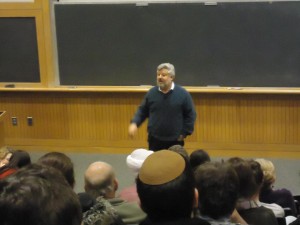Gershon Baskin thinks that there is a lot of complexity in resolving the Middle East conflict, because so much of this deals with the irrational and the two sides don’t act in their own best interest and don’t act logically because there is so much emotional baggage that each side carries along with it.
Gershon Baskin, co-chairman of the Israel Palestine Center for Research and Information, gave a lecture in the Rockefeller Center on Monday.
Israeli-Palestinian peace can only be achieved through a joint partition agreement, Gershon Baskin, co-chairman of the Israel Palestine Center for Research and Information, said in a lecture titled “Is Israeli-Palestinian Peace Still Possible?” in the Rockefeller Center on Monday.The tragedy of the conflict is that a territorial partition would easily resolve the disagreement if the Israelis and Palestinians genuinely believed that the other side also wanted peace, he said.
The IPCRI seeks to address the seven areas that Baskin believes are the source of the Israel-Palestine conflict Palestinian statehood and the nature of its sovereignty, the delineation of borders between the two states, the future of Jerusalem, the future of Palestinian refugees, the physical link between the two Palestinian territories of the West Bank and Gaza, economic relations and water, according to Baskin.“Today in Israel, we cannot organize a demonstration of more than a few thousand people for peace with the Palestinians, but we have 300,000 Israelis protesting the price of cottage cheese,” Baskin said. “That’s the reality of Israel today.”
“Palestine has to become an independent state next to Israel, and the Israeli occupation over the Palestinian people has to end,” Baskin said in an interview with The Dartmouth. “If the conflict ceases to be an existential conflict of us or them and becomes a conflict of us and them, we can make progress.” Both sides are actually willing to work toward peace, but neither believes that it has like-minded partners on the other side, Baskin said. He said he visited a Palestinian refugee camp to discuss the peace process, and he was surprised by the open-mindedness he found. “They told me that [Israel] needs to get out of their face, that they don’t want us controlling their lives, but that they don’t want to throw us into the sea, either,” Baskin said. “They said they wanted to peacefully establish an independent state next to us.”
Despite increased dialogue, however, Baskin said the two sides seem to be further from peace than ever before. None of the five attempted peace agreements has made much progress, he said.
“There is a lot of complexity because so much of this deals with the irrational,” Baskin said. “The two sides don’t act in their own best interest and don’t act logically because there is so much emotional baggage that each side carries along with it.”
Baskin said the only way forward is through secret back-channel negotiations between the Israeli and Palestinian governments, but he does not believe these are currently taking place.
Prior to becoming to an activist, Baskin was inspired by injustices he observed as a young child, he said in an interview with The Dartmouth.
“I sort of came of age in terms of my world view and political awareness in the tail-end of the 1960s,” he said. “I was never big on accepting authority, and I always thought you should break the law and do things that will change the world.”
Eliana Piper ’14 said Baskin’s lecture provided her with a new way of looking at the conflict.
“I think Baskin brings a really unique perspective to the issue since he has worked with both Palestinians and Israelis,” she said. “I hope this event will make people want to talk about it and learn more.”
The lecture was co-sponsored by the Rockefeller Center and J Street U.
Originally Published at: http://thedartmouth.com/2012/02/14/baskin-stresses-need-for-israeli-peace/




